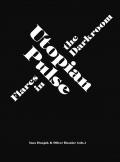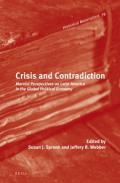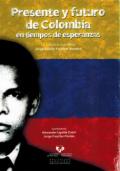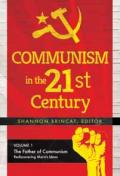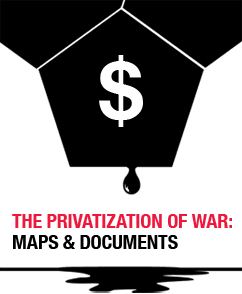Artikel
A Preview of the Future. Workers’ Control in the Context of a Global Systemic Crisis
Originating in a bold exhibition at the Secession in Vienna, this book examines moments in social and cultural life where there are glimpses of utopia, where other possibilities of being are imagined and even partially realised. The book moves through Latin American carnivals, forgotten histories, queer utopias, science fiction, workers' control of factories and much more.
Contemporary Crisis and Workers Control: Chapter 2
This chapter was taken from “An Alternative Labour History” | Edited by Dario Azzellini and published by Zed Books
Entrevista a Dario Azzellini, politólogo y documentalista, miembro del Consejo Editorial de Working USA
En Europa, en el marco de la crisis actual, el movimiento de empresas recuperadas por sus trabajadores está ...
En Europa, en el marco de la crisis actual, el movimiento de empresas recuperadas por sus trabajadores está dando sus primeros pasos
Imprese recuperate dai lavoratori nell'emisfero settentrionale durante la crisi attuale
¡Si, podemos!
Novembre 2014, workerscontrol.net / comunianet.org
Originale pubblicato su Org & Demo (Marília) [ISSN: 2238-5703],Vol. 15, n. 1 jan./jun. 2014, pagg. 9-36 (in spagnolo)
Traduzione dallo spagnolo di Antonella Sartori (revisione mb).
Ein Epochenbruch. Die neuen globalen Proteste zwischen Organisation und Bewegung
Dario Azzellini: Ein Epochenbruch. Die neuen globalen Proteste zwischen Organisation und Bewegung
English abstract:
El estado comunal: consejos comunales, comunas y la democracia en el lugar de trabajo
Resumen: El carácter particular de lo que Hugo Chávez llamó como el proceso Bolivariano, radica en la comprensión de que la transformación social se puede construir desde dos direcciones: “desde arriba” y “desde abajo.” El Bolivarianismo –o el Chavismo– incluye entre sus participantes tanto organizaciones tradicionales como nuevos grupos autónomos; éste comprende corrientes basadas en el estado y corrientes anti-sistémicas.
Empresas recuperadas por sus trabajadores en el hemisferio norte durante la crisis actual
¡Si, podemos!
Resumen: Desde que empezó la crisis financiera y económica en 2008 varias empresas cerradas en EEUU, Italia, Francia, Grecia, Turquía y Egipto han sido ocupadas por sus trabajadores y trabajadoras. Comunes en America Latina, las recuperaciones de empresas constitutyen una novedad en los países del hemisferio norte, donde no habían ocurrido durante los últimos 40 años - más allá de casos excepcionales y aislados.
Paramilitarismo colombiano: El brazo armado ilegal de élites y capital
Publicamos este libro en memoria a Jorge Adolfo Freytter Romero (Santa Marta, 1949 / Carretera Barranquilla-Ciénaga, 2001), profesor en la Universidad del Atlántico y luchador social, que fue secuestrado, torturado y asesinado en agosto de 2001 a manos del paramilitarismo conectado con sectores del aparato estatal colombiano.
Interview with Marina Sitrin and Dario Azzellini about their new book 'They can't represent us!'
Link to the audio interview with Marina Sitrin and Dario Azzellini about their new book 'They Can't Represent Us!: Reinventing Democracy from Greece to Occupy'
Infos rund um das Sportereignis
Fußball-WM im WUK
Die Fußball-Weltmeisterschaft findet heuer in Brasilien statt – und wird auch im Innenhof des WUK mittels public viewing gezeigt. In dieser Sendung beschäftigen sich WUK Radio mit den politischen und sozialen Konnotationen dieses Großereignisses.
Sendungsgestaltung: Jürgen Plank
Mit: Dario Azzellini
You are missing some Flash content that should appear here! Perhaps your browser cannot display it, or maybe it did not initialize correctly.
Translation into Portuguese of the article 'Venezuela: Where the Wealthy Stir Violence While the Poor Build a New Society' published on Creativetimereport, April 28, 2014
Venezuela: Os ricos incitan à violência enquanto os probres constroem uma nova sociedade
Antes de Hugo Chávez ter chegado à presidência da Venezuela em 1999, os bairros de Caracas construídos precariamente nos morros nos subúrbios da capital nem sequer apareciam no mapa da cidade.
Translation into Spanish of the article 'Venezuela: Where the Wealthy Stir Violence While the Poor Build a New Society' published on Creativetimereport, April 28, 2014
Venezuela: Los ricos incitan a la violencia mientras los pobres contruyen una nueva sociedad
Antes de que Hugo Chávez llegara a la presidencia de Venezuela en 1999, los barrios de Caracas construidos precariamente en los cerros en los suburbios de la capital ni siquiera aparecían en el mapa de la ciudad.
Relación entre paramilitarismo y desestabilización violenta
Venezuela: la lucha contra lo social
En los medios de comunicación internacionales hemos podido leer durante meses de “protestas” en Venezuela y de “muertos en las protestas”, pero las acciones que desde comienzos de marzo llevan a cabo pequeños grupos armados ágiles no tienen nada en común con lo que se entiende regularmente por “protesta”.
Translation into Bosnian of the article "Workers’ control at Fralib: the brand with the Elephant" published on roarmag, May 1, 2014
Radnička Borba: Okupacija tvornica u Francuskoj
Kada je velika multinacionalna kompanija Unilever zatvorila tvornicu čaja na jugu Francuske radnici su okupirali svoju fabriku
U Francuskoj postoje dva slučaja oživjelih tvornica koje su okupirali radnici tokom krize. Jedna je Pipla Ice Cream Factory, koja je upravo počela proizvoditi organski sladoled i jogurt kao tvornica koju vode i čiji su vlasnici radnici, nakon dugotrajne borbe. Druga je Fralib Tea Factory. Obje su bili zatvorene nakon što su njihovi vlasnici, velike multinacionalne kompanije, odlučile preseliti proizvodnju.
Nem képviselnek minket! – interjú Dario Azzellinivel és Marina Sitrinnel
A Helyzet Műhely és a PERG meghívására Marina Sitrin (MS) New York-ban dolgozó író, aktivista és Dario Azzellini (DA) Berlinben és Caracasban dolgozó művész és dokumentumfilm-rendező a globális mozgalmak helyzetéről és lehetséges jövőjéről tartottak előadást a múlt hónapban. A Gólyában az általuk Caracasban forgatott Comuna Under Construction (2010) című dokumentumfilm vetítése után Meszmann Tibor (MT) beszélgetett velük.
MT: Aktivisták vagytok és akadémikusok. Nemcsak kutatjátok, részt is vesztek társadalmi mozgalmakban. Hogyan látjátok a saját szerepeteket?
Translation into Italian of the article "Workers’ control at Fralib: the brand with the Elephant" published on roarmag, May 1, 2014
Controllo operaio alla Fralib
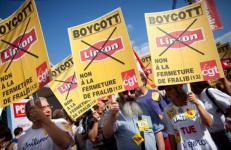
In Francia ci sono due casi di fabbriche recuperate occupate dai lavoratori nel corso della crisi attuale. Una è la fabbrica di gelati Pilpa, che ha appena avviato la produzione di gelati e yogurt biologici come società di proprietà dei lavoratori e gestita da essi dopo una lunga lotta. L’altra è la produttrice di tè Fralib. Entrambe erano state chiuse dalle loro gigantesche proprietarie multinazionali per delocalizzare la produzione.
Translation into hungarian of the article 'Venezuela: Where the Wealthy Stir Violence While the Poor Build a New Society' published on Creativetimereport, April 28, 2014
Venezuela: Ahol a jómódúak erőszakot gerjesztenek, miközben a szegények egy új társadalmat hoznak létre
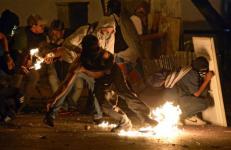
A művész és dokumentumfilmes, Dario Azzellini szerint a tüntetések Venezuelában aljas támadást jelentenek az ország Hugo Chávez elnöksége alatti társadalmi fejlődése ellen, a jómódú régiók anti-chavista erői részéről.
Traduzione in italiano dell'articolo 'Venezuela: Where the Wealthy Stir Violence While the Poor Build a New Society' pubblicato su Creativetimereport, April 28, 2014
Venezuela: dove i ricchi fomentano la violenza e i poveri costruiscono la nuova società
L’artista e documentarista Dario Azzellini sostiene che le proteste in Venezuela rappresentano un feroce attacco al progresso sociale del paese ottenuto durante il governo di Hugo Chávez, incoraggiato da politici anti-chavisti che vivono nelle zone dei benestanti.
Prima che Hugo Chávez diventasse presidente del Venezuela nel 1999, i barrios di Caracas, costruiti alla buona sulle colline che circondano la capitale, non comparivano nemmeno sulla mappa della città.
Translation into Zchech of the article 'Venezuela: Where the Wealthy Stir Violence While the Poor Build a New Society' published on Creativetimereport, April 28, 2014
Venezuela: Bohatí podněcují násilí, chudí budují společnost
Než se v roce 1999 stal prezidentem Venezuely Hugo Chávez, caracaské barrios, postavené na kopcích obklopujících metropoli, se ani neobjevovaly na mapě města. Oficiálně neexistovaly, město ani stát neudržovaly svou infrastrukturu. Chudí obyvatelé těchto čtvrtí získávali vodu a elektřinu, když se na kabely a trubky napojovali sami. Neměli přístup k různým službám jako je odvoz odpadu, zdravotní péče a vzdělání.
When the big multinational Unilever shut down a tea processing plant in the south of France, the workers reacted immediately by occupying their factory.
Workers’ control at Fralib: the brand with the Elephant
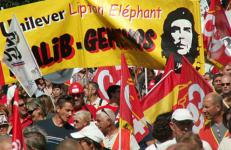
In France there are two cases of recuperated factories occupied by workers during the current crisis. One is the Pilpa Ice Cream Factory, which just started producing organic ice cream and yoghurt as a worker-owned and administered company after a long-lasting struggle. The other is the Fralib Tea Factory. Both were closed by their huge multinational owners to relocate production.
Artist and documentary filmmaker Dario Azzellini argues the protests in Venezuela represent a vicious attack on the country's social progress under Hugo Chávez, spurred on by anti-Chavista politicians in affluent regions.
Venezuela: Where the Wealthy Stir Violence While the Poor Build a New Society
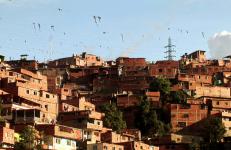
Before Hugo Chávez became president of Venezuela in 1999, the barrios of Caracas, built provisionally on the hills surrounding the capital, did not even appear on the city map. Officially they did not exist, so neither the city nor the state maintained their infrastructure. The poor inhabitants of these neighborhoods obtained water and electricity by tapping pipes and cables themselves. They lacked access to services such as garbage collection, health care and education altogether.
Chávez e il Potere Costituente
“No, il potere costituente non può essere ostacolato, non può essere ostacolato dal potere costituito [...] Alcuni autori parlano della terribile natura del potere costituente. Penso che sia terribile il potere costituente, terribile, complesso, rivoluzionario ma ne abbiamo bisogno. Non ci si dovrebbe sottomettere al potere costituente [...] il potere costituente è e deve essere- compatrioti- una potenza permanente, una potenza di elaborazione, un’iniezione rivoluzionaria, per ripristinare, molto occasionalmente, il nostro processo bolivariano”.
Gewaltsame Destabilisierung und Paramilitarismus hängen in Venezuela eng zusammen
Der Krieg gegen das Soziale
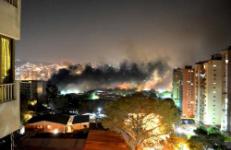
In deutschen und internationalen Medien ist immer noch von "Protesten" in Venezuela und "Toten bei Protesten" zu lesen – doch mit dem, was gemeinhin als "Protest" verstanden wird, haben die Aktionen kleiner, bewaffneter, agiler Gruppen seit spätestens Anfang März nichts mehr gemein. Nachdem die gewalttätige Mobilisierung der Opposition, die Anfang Februar begann und von einer beispiellosen internationalen Medienkampagne begleitet wurde, ihr Ziel des Sturzes der Regierung in Venezuela nicht erreichen konnte, sind die Aktionen zunehmend in Terrorismus übergegangen.
Interview with Dario Azzellini and Marina Sitrin by Anna Belladelli
In September 2011, activists occupied Zuccotti Park in Manhattan, initiating a new wave of struggle against capitalism and unprecedented recession. The impact of the Occupy movement has been noticeable also outside the USA, affecting forms of protests, actions, and language.
The grassroots of Venezuela
The mainstream media view has it that left-leaning populists are keeping democracy in a stranglehold. Seen from the grassroots in Venezuela, that view is very different. We interview Dario Azzellini, an assistant professor, activist who spends a lot of time in Venezuela, and a filmmaker.
You are missing some Flash content that should appear here! Perhaps your browser cannot display it, or maybe it did not initialize correctly.
Öffentlichkeit Reloaded
Der Raum des Politischen, das heißt der öffentlichen Debatte, der Partizipation und des Mitentscheidens wurde sukzessive verengt. Warum und welche möglichen Auswege es gibt versuchen wir anhand der bisherigen Sendungen zum Thema #Öffentlicher Raum #Öffentlichkeit real und virtuell nachzuzeichnen.
Mit Dario Azzellini u.a.
Moderation: Daniela Schopf und Stefan Greinöcker
You are missing some Flash content that should appear here! Perhaps your browser cannot display it, or maybe it did not initialize correctly.
The Communal System as Venezuela’s Transition to Socialism
"The purpose of this chapter is to explore practices in the Bolivarian Revolution in Venezuela linked to the idea of a transition to socialism through the construction of communal production and consumption cycles controlled by workers and communities. The envisioned transition combines local self-administrat on and workers’ control of the means of production. The present work concentrates mainly on the experiences of local self-administration.
Aus dem Newsletter Dezember 2013 von Dario Azzellini
Wahlen in Venezuela
Nach den letzten Berechnungen hat die PSUV 241 Gemeinden gewonnen. Weitere Parteien die den Prozess unterstützen haben 14 Bürgermeisterämter gewinnen können und die Opposition 74.
------
Im Newsletter versandter Artikel:
